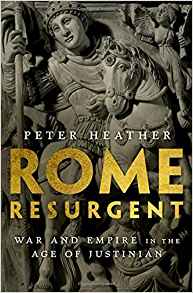Rome Resurgent by Peter Heather
/Rome Resurgent: War and Empire in the Age of Justinian
by Peter Heather
Oxford University Press, 2018
The “Ancient Warfare and Civilization” series from Oxford University Press continues with Peter Heather's new book, Rome Resurgent: War and Empire in the Age of Justinian. Heather, Professor of Medieval History at King's College London, is the author of some solid, first-rate popular histories, books like The Fall of the Roman Empire and The Restoration of Rome, and here he takes on the epic subject of the Emperor Justinian's attempts in the 6th century to reclaim for Rome the vast territories it had lost in the 5th.
The subject is both historically pivotal and genuinely fascinating, so it hasn't lacked for chroniclers. It was written up at the time by an eye witness, direct participant, and great historian, Procopius, and centuries later it formed one of the most memorable chunks of Edward Gibbon's The Decline and Fall of the Roman Empire. In the modern era it's been researched and re-told superbly several times, including in Averil Cameron's magisterial 1985 book Procopius and the Sixth Century and in Anthony Kaldellis' definitive annotations for his 2014 edition of Procopius' The Wars of Justinian.
Heather approaches the whole subject wanting to understand which historical characterization of the era makes more sense: was Justinian a “romantic visionary” intent on using all his money and resources (and the tactical and strategic brilliance of generals like Belisarius and Narses) to re-conquer tracts of Italy and North Africa in order to restore the glory of Rome, or was he a self-deluded crackpot whose extravagantly expensive military campaigns left Constantinople and the rest of the Eastern Empire weak and vulnerable to the Islamic aggression it would face in the 7th century? Procopius, our man on the spot, is precious little help in resolving such questions, since he famously left posterity both adulatory and damning portraits of Justinian & Co. And all subsequent historians seem to come to the subject with high feelings; in this Heather himself is no exception, taking no trouble to hide the fact that he's not exactly Justinian's biggest booster:
The constant in all this was emphatically not rational strategic calculation focused on the good of the empire as a whole … Justinian cared not a jot for the good of his subjects (or anyone else for that matter). His priority throughout was nothing more than maintaining his regime's political control over the empire. His subjects and opponents could die in their tens of thousands, as far as the emperor was concerned, so long as Justinian sat securely on his throne (whatever his propaganda might declare).
Ultimately, the question may be unanswerable, although Heather offers a very pleasingly nuanced stab at it in the course of his book. The main attraction in these pages is otherwise in any case: this is an easily authoritative and often riveting narrative history of one of the most remarkable reigns in Roman history, East or West. Heather utilizes his sources in ways that are extensive but never credulous (an especially important matter where Procopius is concerned, since he has a tendency to dominate narratives), and he pays as much attention to personalities as he does to broader, more conceptual issues. The story of Justinian and Belisarius now has a smart new 21st century benchmark.
Steve Donoghue was a founding editor of Open Letters Monthly. His book criticism has appeared in the Boston Globe, the Wall Street Journal, and the American Conservative. He writes regularly for the National, the Washington Post, the Vineyard Gazette, and the Christian Science Monitor. His website is http://www.stevedonoghue.com
